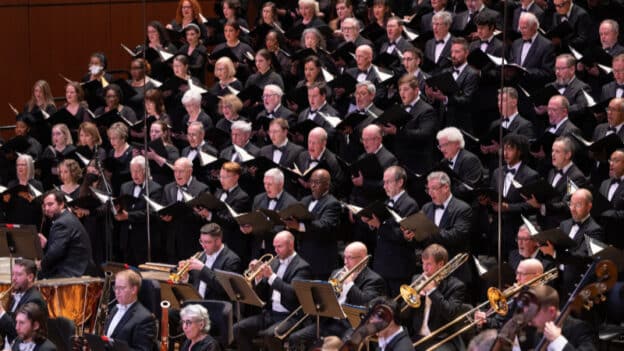So how much are US orchestra chiefs getting paid?
mainIt’s the time of year for consultant Drew McManus to produce his annual compensation reports on US orchestras. Today it’s executive directors, tomorrow music directors.
The data are based on tax returns for 2011/12 and are therefore a little behind the times, before the Minnesota debacle.
Average chief executive wages rose 5.81 percent in the 2011/12 season.
The top three executives earned:
1 Los Angeles Philharmonic (including Hollywood Bowl): $1,751,039
2 New York Philharmonic: $912,858
3 San Francisco Symphony: $638,857
Read all the rest right here.

Peter Gelb at the Met, by comparison, is on $1.8 million this year.





Thieves of all stripes gravitate to the loot. You think they’re in it for the art?
These ciphers are a scandal. It is sickening to see these parasitic positions skimming the budgets of musical institutions who have to fear for their survival in the modern world. An average salary for such executives of ca. 60,000 would be quite normal and should be acceptable…. they are not even musicians. It all confirms Lebrecht’s book ‘Who killed classical music?’
When the art form turns into an exploitative commerce, where the repertoire is merely the means to an end, the art will die.
You have it all wrong. They are not taking from the institutions.
The flow is from the boards, and the members are happy for a portion of it to go to someone in whom they have confidence, with whom they can relate as businesspeople, to whom they can entrust the baby.
Deborah Borda and Peter Gelb are handling tens of millions of dollars of board-member money. Their salaries are a small fraction of this.
The institution is always the net beneficiary.
The institution is the net beneficiary only when the CEO performs well. Gelb’s performance is questionable to say the least.
That seems nonsensical to me. The board of an orchestra is obviously part of the institution as a whole.
Yes, the board is “part of the institution” by definition.
But board members in the U.S. are volunteers, typically from the business community. Their money is their own, or, often, the money they donate belongs to a for-profit entity where the member works.
What I was trying to say, John, was that when you use words like “parasitic” and “skimming,” you ignore the direction of the flow.
From the standpoint of a board that is raising $100 million a year, it makes no practical difference whether the person in charge is paid, say, $600,000 or $1.8 million.
It makes a huge difference whether that person is running the organization effectively or not, because a bungler would give the board headaches and consume their time — the most valuable commodity of all.
Norman and Drew McManus simply report the facts, without judging, as far as I can see.
He has a 10-year contract through 2022, worth some $18 million apparently. So they must be happy with his performance.
I’m not sure that any of us here on Slipped Disc can judge. We lack some of the facts and we cannot see his work from the board’s perspective.
The upcoming strike / lockout / resolution will be revealing.
The salaries do not seem excessive by today’s standards. Orchestral managers are dealing with artistic, administrative, fund raising, union and civic issues and problems. People with those skills do not ‘grow on trees’ and are hard working and dedicated managers trying hard to keep music alive in communities where music education is often subject to cuts in the school systems. It is a demanding job and the pay is commensurate with the responsibility.
That seems nonsensical to me. A board of an orchestra is obviously part of the institution as a whole.
Thank you John Borstlap for the excellent quote, which pretty well sums it all up:
When the art form turns into an exploitative commerce, where the repertoire is merely the means to an end, the art will die.
That is what the classical music world has become and all those that profit from it, in such an exploitative way, using the money of hard working people to line their own pockets as CEOs and Music Directors of non-profits are like flies to sh**. They are nothing better, especially in the current financial environment for the arts sector!